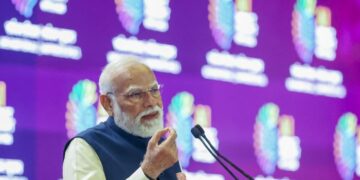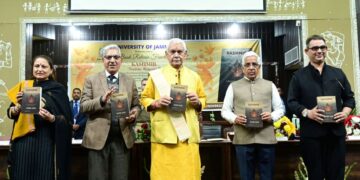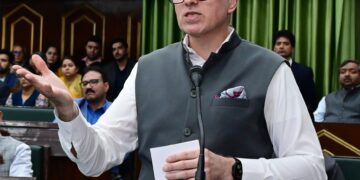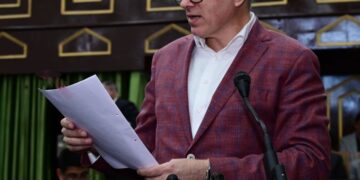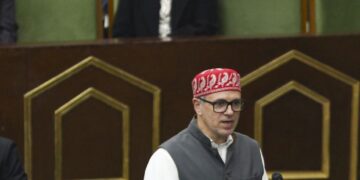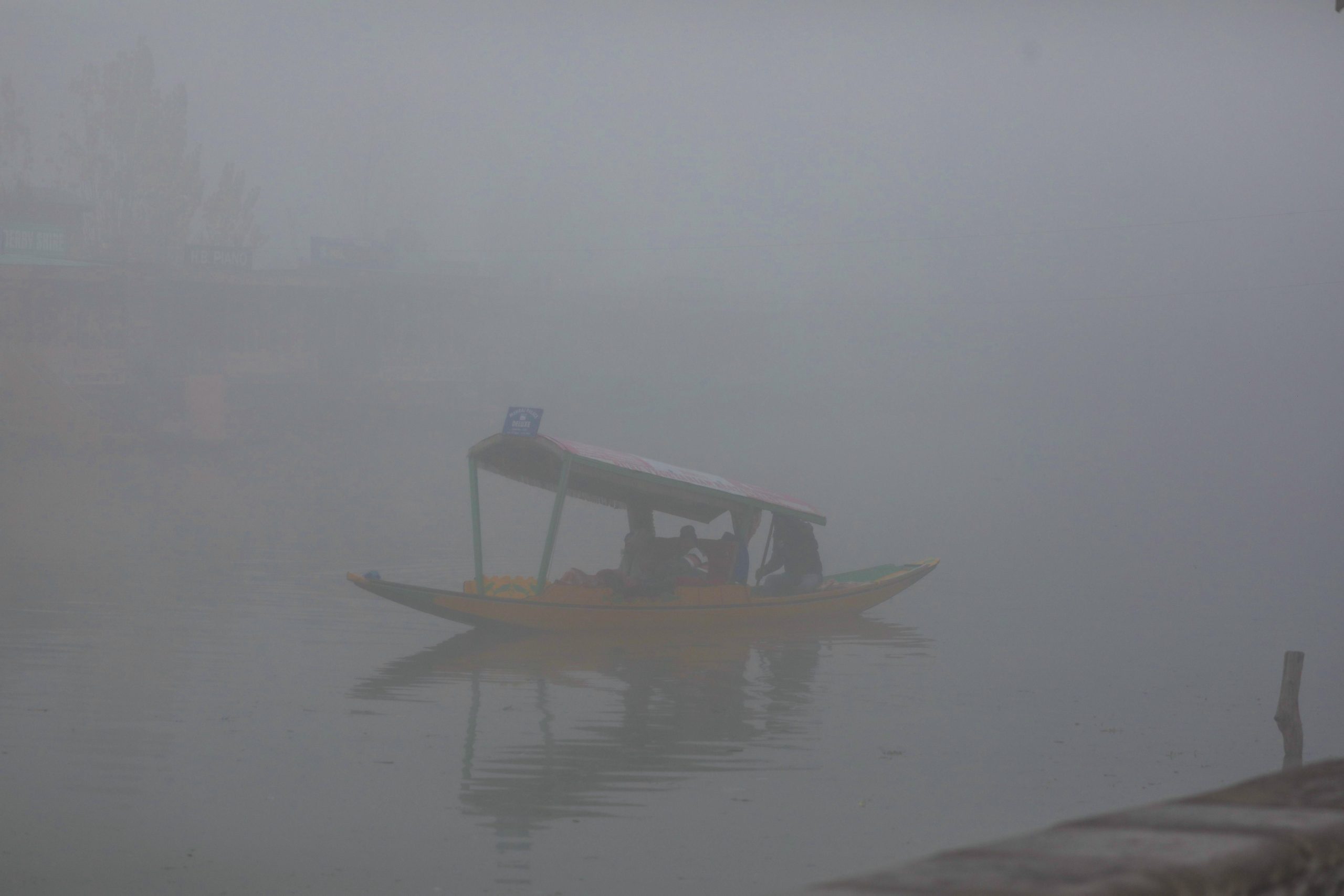Srinagar: Dismissing suggestions that his National Conference was under pressure to join the BJP-led NDA, Chief Minister Omar Abdullah on Thursday expressed optimism that the promises made by the Centre to restore statehood of Jammu and Kashmir will be fulfilled at the earliest.
During his first media meeting here since assuming office in October, Abdullah emphasised that the region’s current status as a Union Territory should be viewed as a temporary arrangement, with the restoration of statehood being the “biggest challenge” his government faces.
Abdullah dismissed rumours suggesting pressure from the BJP-led National Democratic Alliance (NDA) to alter the National Conference’s ideology and join the alliance.
“There is no pressure from the Prime Minister (Narendra Modi), Home Minister (Amit Shah) or the Raj Bhawan on us to change our ideology,” he said.
The chief minister added that he has received assurances from the prime minister and home minister that the National Conference government would remain stable and that they would receive the same cooperation extended earlier to the lieutenant governor earlier.
“They have stated they will respect the mandate of the people. Those spreading rumours that I will now join NDA and that I have changed my ideology, I cannot help that. I am here to work and I will work,” he said at the media interaction held at the Sher-i-Kashmir International Convention Centre (SKICC).
In response to a question whether his government was planning to approach the court for restoration of statehood, Abdullah said that confrontation should be the last resort.
“Simply going to court will be a fight. A fight should never be the first option, it should be the last option. If the Supreme Court had not spoken about the restoration of statehood, if the prime minister and home minister had not spoken about it, then we could have gone to court. They have made promises and we have to give them a chance first,” he said.
“The Supreme Court in its judgement had also stated that the statehood should be restored as soon as possible. One year has passed since and we think one year should be enough,” Abdullah said.
The chief minister took questions on various issues confronting his two-month-old government, including the functioning of an elected government that has to share powers with the Centre’s appointee — the lieutenant governor.
He argued that “dual centres of power are not advantageous” and that effective governance is best achieved with a single command structure.
While acknowledging some differences of opinion with the Raj Bhavan, Abdullah insisted that these disagreements are not as severe as speculated.
“Obviously, dual centres of power are not to anyone’s advantage. If dual centres were effective tools of governance, you would see it everywhere,” he said.
Abdullah acknowledged the difference of being a chief minister of a Union territory and a state, saying “it has been a little over two months since we came to power. It took us time to understand how the UT government works. We have been associated with the government earlier, but there is a vast difference between that form and the present form”.
The Centre on August 5, 2019, abrogated Article 370 stripping J&K of its special status and divided it into two Union territories — J&K and Ladakh. While the former has a legislative assembly with limited authority, Ladakh operates without one.
In December 2023, the apex court upheld the Centre’s actions regarding the revocation of special status but reiterated the need for the swift restoration of statehood.
Reflecting on his government’s initial experiences, Abdullah described the start as “decent”, stating that they have initiated processes to fulfill election promises.
He insisted that their election manifesto is not limited to a few weeks or months, but is intended for a full five-year term.
“We are bound by our election promises. We have started the process of implementing some of the promises and for other promises, we need change in the system. I hope J-K being a UT is a temporary phase,” Abdullah said.
The chief minister also announced that the business rules for the government will be formulated after thorough consultations and subsequently presented to Lieutenant Governor Manoj Sinha.
Emphasising the importance of addressing public concerns, he encouraged citizens to seek resolutions wherever possible, whether at the Raj Bhavan, with local MLAs, or with government officials.
On National Conference MP Aga Syed Ruhullah Mehdi joining protests over reservation near his residence in Gupkar, Abdullah asserted that NC is a democratic party where every member has the right to express their views.
“While we have been accused of being a family party, we are a democracy, and everyone is entitled to their opinion,” Abdullah stated, highlighting the positive changes that have emerged in recent times.
He noted that protests, once deemed illegal, have transformed into a means for citizens to voice their concerns directly to him.
“…People protested and reached my door. We had a meeting afterwards,” he added, referring to the protest near his residence in Gupkar which was joined by Mehdi.
On the reservation issue, Abdullah said that a cabinet sub-committee has been established to address the matter.
He expressed hope that Mehdi would advocate for the restoration of statehood in Parliament as he rallies for reservation rights.
Abdullah, however, said while we can fight over the reserved and open category, “but first we have to save our jobs”.
“What will we do when people from other places come here for jobs?” he asked.
Responding to questions about the Raj Bhavan’s decision not to restore public holidays for the birthday of NC founder Sheikh Mohammad Abdullah and Martyr’s Day on July 13, the chief minister reiterated that such decisions cannot erase the legacy of those who made significant sacrifices for the region.
“The holidays became a big story. Ideally, we would want to have them as they are emotionally attached with people,” he added.
Abdullah also said that his government was framing a policy to address the situation of hoteliers in Gulmarg whose land leases have expired after they had opted for the now-disbanded Roshini scheme.
Asked about difficulties faced by the candidates on account of police verification for appointments in the government jobs, Abdullah said although it is outside his domain as of now, he has discussed the matter with the CID chief.
“I have been saying this that a militant’s son is not a militant. Consciously, we did away with this blacklisting (in his first term as CM). We can only counsel about it right now. But I believe there is some relief. More will be done for them when we are a state,” he said.
Abdullah also said that his government was framing a policy to address the situation of hoteliers in Gulmarg whose land leases have expired after they had opted for the now-disbanded Roshini scheme.
Responding to a question on the row over land acquisition for a campus of the National Institute of Technology (NIT) in south Kashmir’s Pulwama district, the chief minister said there is a need to find a balance between development and protecting our productive agricultural land.
“We cannot increase our land, development cannot stop. We will try to ensure that development projects are on non-productive lands as much as possible. I met a delegation from Pulwama and I said to them that if you don’t want NIT in Pulwama, we will take it to some other location,” Abdullah said.
“Not everyone is against development. There are other areas where we can locate this NIT. We will have to find a balance between development and protecting our productive agricultural land,” he added.
On the opposition’s allegation about a satellite colony being built, the chief minister said there is no such proposal on his table as he looks after the department.
“The people who are making the most noise were the ones who talked about greater Jammu and Srinagar,” he said.
The chief minister said if the townships were built, they would just be for decongesting the Srinagar city.
“When we talk generally to the residents in Srinagar, they talk about decongestion. There is the problem of housing. 3-4 families are living in a single house, they say if they get an opportunity they would move to the suburbs,” Abdullah said.
“If the townships will be built, those will not be to settle the outsiders, but for the people of Srinagar, to decongest the city. But there is no such proposal or plan before the government yet,” he added.
‘Kashmir issue has not been resolved’
Countering the BJP’s narrative that the “Kashmir issue” had been resolved with the abrogation of Article 370 five years ago, Chief Minister Omar Abdullah on Thursday pointed out that a part of the erstwhile state continues to be occupied by Pakistan.
“Let us assume for a minute that this side of the Kashmir issue has been resolved, but let us not forget that there is another part of Jammu and Kashmir across the line of control (Pakistan-occupied-Kashmir).
“When the BJP says that the Kashmir issue has been finally resolved, should we assume that the part across the border has also been resolved? But in reality it has not been,” he said.
He was responding when asked if he believed that the Kashmir issue was resolved with the abrogation of Article 370 as has been maintained by the BJP.
“So, the Kashmir issue remains whether this side of LoC or that side, we can debate about it but the issue has not been resolved. We want it to get resolved,” he said.
National Conference leaders have in the past been arguing about a Parliament resolution of February 22, 1994 in which the entire House had noted with “deep concern Pakistan’s role in imparting training to the terrorists in camps located in Pakistan and Pakistan Occupied Kashmir”.
The resolution had called upon Pakistan to vacate the areas of the Indian State of Jammu and Kashmir which they have occupied through aggression.
‘J&K to focus on reducing power distribution losses, speed up metering’
Chief Minister Omar Abdullah on Thursday said his government will focus on reducing power distribution losses and expediting metering in the union territory to ensure more electricity supply for the people.
“Metering is an ongoing process, it is a part of the government of India scheme. We are committed to implementing it and we will. Obviously, the more metering that happens, the less pilferage there will be,” Abdullah told reporters at a media interaction here.
He said both the J&K administration and the Union Power Ministry are committed to advancing these reforms and ensuring their successful implementation, “which we will do”.
Further, the chief minister said J&K is spending Rs 9,500 crore a year to buy power from the Centre.
On the power cuts in Kashmir, Abdullah said the government is providing more electricity supply to the people than the previous year.
“…we are supplying 1,700-1800 MW electricity, but the unrestricted load is more than that,” he said.
He said the sooner the power projects in J&K are completed, the sooner more electricity can be provided to the people.
“Even if their generation in winters is low, we can bank the power generated during summers. We will try to bank more electricity in the summers every year so that we utilise it in the winters,” he said.
The chief minister said J&K’s AT&C losses are more than 50 percent and efforts are on to bring it down.
“Other states have brought it down to 15-17 percent. Our endeavour is to bring it down at least below 20 per cent so that we can supply more electricity to the people,” he added.
Asked about his poll promise of providing 200 free units of electricity, Abdullah said the scheme will be rolled out in March or April.
“What we have promised in our manifesto. That will only happen when there is (complete) metering. We measure units only when there is metering…,” he said. (PTI)
‘Hope PM doesn’t succumb to pressure, sends chadar to Ajmer dargah’
Jammu and Kashmir Chief Minister Omar Abdullah expressed hope on Thursday that Prime Minister Narendra Modi would not succumb to pressure from any quarters and continue the yearly tradition of sending a “chadar” to the Ajmer dargah.
“You cannot separate religion from politics. We say that there should be a separation of the church from the State, but that does not happen. Votes are being sought in the name of religion, politics is done in the name of religion. This is a reality that we should accept. (However), I hope that the prime minister does not succumb to any pressure and sends a chadar to Ajmer,” Abdullah told reporters here.
He added that the sentiments of the members of various communities are attached to the Ajmer dargah.
“It is not that just the people of a particular religion visit the Ajmer dargah. While Muslims go there, many non-Muslims also visit the dargah. The sentiments of many people are attached to it.
“Thankfully, the Supreme Court has put a stop to people trying to look for temples underneath mosques. When the court comes to an overall decision, that will be binding on everyone,” he said.
Asked if the change in his dressing style over the last couple of years is to assert his Muslim identity, Abdullah said he does not wear clothes to send out wider messages.
“I do not open my cupboard in the morning thinking what I will wear that day or with an aim of sending out a message. I should think (what to wear) because sometimes I get into trouble. I wear a Sozni cap because it is part of my heritage. I wore a ‘pagdi’ (turban) in Jammu because of my respect for all cultures. It does not weaken my faith.
“If there is a message going out, I am not doing it on purpose. I wear this cap because it suits me and keeps my head warm as my hairline is receding. I tried to put on a Karakul cap but that does not suit me,” he added.
Responding to a question, the National Conference (NC) leader said the government does not need to do anything to project a secular image of Kashmir as the people of the valley are doing it on their own.
“During the recent snowfall, we saw it again. People opened their homes and mosques to accommodate tourists. Deputy commissioners or officials did not force them to do it. Whenever there is a need, people will do it,” he added.



